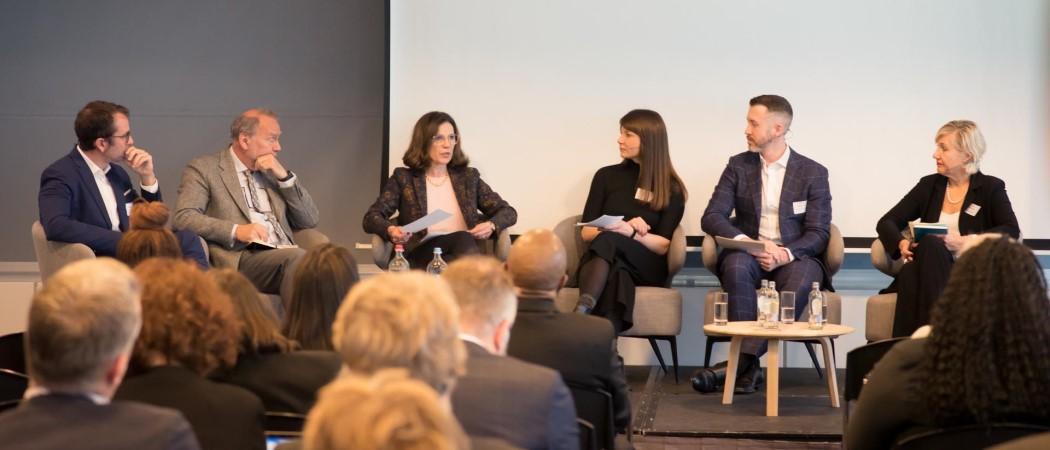Speakers at S|B conference call for more co-operation between the EU and the Global South on research into major health challenges

Deepening cooperation with the Global South for sustainable health futures session at the Science|Business Annual Conference
Investment in research to tackle poverty-related and neglected diseases – such as TB and malaria – has fallen since the COVID-19 pandemic, according to Andrew Tuttle, chief strategy officer of Policy Cures Research. After rising steadily, annual investment in such research began to plateau in 2018 and then declined in the wake of the pandemic, he told a session entitled Deepening cooperation with the Global South for sustainable health futures at the Science|Business Annual Conference, organised in partnership with DSW.
This alarming trend forms the backdrop to the negotiations around the next EU Framework Programme, FP10, which will aspire to improve the prospects for citizens around the globe. FP10 will seek to build on the work of the European and Developing Countries Clinical Trials Partnership (EDCTP), which focuses on Africa, where TB, malaria and other poverty-related and neglected diseases are particularly prevalent.
The EDCTP operates as an equal partnership of EU member states, African countries and the European Commission with an annual budget of €1.6 billion. This work is translating into tangible results, Maria Cristina Russo, director, global approach and international cooperation, DG RTD, European Commission, told the conference. While we do not know how much money will be allocated to FP10, Russo said, we have demonstrated the effectiveness of our initiatives with the Global South.
The EDCTP needs the help of African politicians to mount trials, she added, stressing the importance of fully involving African countries by shifting away from just giving funds to the concept of co-ownership. Creating sustainable science in the Global South requires not only funds for development “but really a co-design of research programmes,” agreed Benjamin Roche, research director, French National Research Institute for Sustainable Development (IRD). That means starting with the actual problems and understanding what research will produce answers connected to questions on the ground.
Incentivising greater investment in neglected areas
There are plenty of gaps to fill. Tuttle highlighted how two crucial areas of women’s health, postpartum haemorrhage and pre-eclampsia, attract less than 1% of reproductive health research funding from the EU and its member states. The reason for that, he said, is the high risk of market failure for healthcare aimed at pregnant women in developing countries. Industry, he said, must be compelled to come to the table, along with better incentives: carrot and stick.
Professor Glenda Gray, president and chief executive officer of the South African Medical Research Council, stressed the need to rebalance science in terms of gender and race. Taking on the structural barriers that have prevented the advance of women is, she said, an active, data-driven process. Recognising that women peak later than men, her council has introduced differential age limits for early-stage women and men applying for grants – 40 for women and 35 for men – as well as instigating calls that only women or black scientists may apply for. New approaches have also seen black scientists move from being the recipients of 2% of research funding to 70%.
Gray said research in Africa has been held back by the “extraction model” whereby data and research results pass to the Global North. South Africa is one of the biggest spenders on R&D on the continent of Africa. Even so, it’s investing just 0.85% of GDP in research against an African Union target of 2%.
Still, there are reasons for optimism, according to Peter Piot, special adviser on European and global health security to President von der Leyen, European Commission. “We tend to focus on everything that goes wrong, but there has been tremendous progress,” he said, flagging falling infant mortality rates, HIV survival, and progress on women’s health and neglected diseases. This is partly due to the advancement of science and of socioeconomic development, but also down to global funding.
Another sign of progress is the involvement of entrepreneurs. Piot had been at the Gates Foundation Grand Challenges meeting in Dakar last year, and what had given him the most joy had been the number of young entrepreneurs, many of them women. The people are there, he said, but are sometimes held back by institutions, salaries or incentives.
Although Piot praised the emphasis on cooperation and a multi-sectoral approach in the recently-adopted European EU Global Health Strategy, he was clear that the agenda for global health should not be set in Brussels. It has to be the work of a global cooperation, and it should go back to square one, identifying not just opportunities, but also neglected areas. Piot also stressed the need to think multi-sectorally and interdisciplinary, and end-to-end, from basic research to products. His final message: if there is no trust in research we can forget everything – if people refuse to take a vaccine, it won’t work.




 A unique international forum for public research organisations and companies to connect their external engagement with strategic interests around their R&D system.
A unique international forum for public research organisations and companies to connect their external engagement with strategic interests around their R&D system.